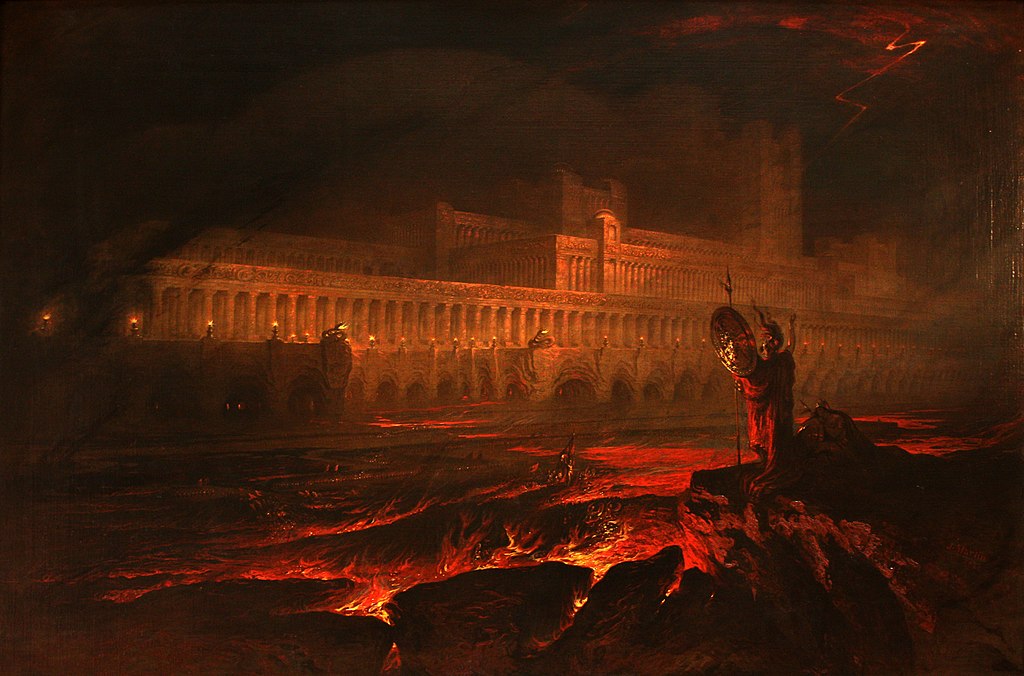Key Takeaways
- The term “hell” in the Bible can refer to different concepts, such as Sheol, Gehenna, Hades, and Tartarus, which are translated differently in various Bible versions.
- While some sources claim Jesus spoke more about hell than heaven, there is no clear consensus on the exact frequency of mentions. The number can vary depending on how one counts direct references versus indirect teachings.
- The Bible places significant emphasis on both the concepts of hell and heaven, as they represent the eternal consequences of rejecting or accepting God’s grace and salvation through Jesus Christ.
- Rather than focusing solely on the numerical frequency, the Bible’s teachings on hell and heaven underscore the importance of living in alignment with God’s love and seeking reconciliation with Him through faith in Christ.
- The term “hell” in Christian theology carries significant implications, emphasizing the need for faith, repentance, and salvation through Christ.
Introduction – How Many Times Is Hell Mentioned In The Bible Compared To Heaven?
That’s a question that can keep you up at night, my friends.
You know, the concept of hell has been a real head-scratcher for folks throughout history.
It’s like a mystery box, and when you open it, you get a whole bunch of different interpretations.
But here’s the deal, the word “hell” itself is a bit of a chameleon.
It changes its colors depending on which translation you’re reading.
You might run into Sheol, Gehenna, or Hades.
It’s like the Bible is speaking a whole bunch of languages, and we need the Rosetta Stone to decipher it.
Now, on the flip side, we’ve got heaven.
Oh, heaven, that’s the sweet spot, right?
It’s like the ultimate destination, where everything is pure joy.
You’ve got the choirs of angels, the pearly gates, and all that good stuff.
So, we’ll be counting mentions of hell and heaven in the Old Testament and the New Testament, peeling back the layers to understand what’s going on in these passages.
It’s not just about numbers, folks; it’s about understanding the heart of our faith and what’s at stake.
We’re going to unlock some biblical mysteries and dive deep into what the Good Book has to say.
Get ready, it’s going to be an enlightening ride!🌟
A Tale of Two Realms: Unpacking “Hell” and “Heaven” in the Bible

Photo modified by BibleBreathe.com. Original photo by Ana Benet on Pexels
As we stroll through the captivating stories and teachings of the Bible, our minds naturally wander to the grand concepts of “hell” and “heaven.”
These are like two distinct cities—one draped in shadows, the other bathed in glorious light.
Let’s take a journey into the scriptures to uncover just how often these realms are spoken of and what subtle differences translations might offer.
A Language Adventure: Navigating Different Words
In our quest to understand the frequency of “hell” and “heaven” in the Bible, we set sail across the sea of translations.
We’ll be riding the waves of the King James Version (KJV), New International Version (NIV), English Standard Version (ESV), and New Living Translation (NLT).
Each of these is like a unique ship navigating the vast ocean of biblical wisdom.
Our mission: count the occurrences of “hell” and “heaven,” and observe how time’s currents have shaped these words.
Ancient Tongues: The Language Contrast
To start this voyage, we need to grasp the ancient languages that birthed the scriptures.
Hebrew and Greek, the ancestral languages of the Old and New Testaments respectively, held subtle meanings that, when translated, resulted in diverse terms like Sheol, Gehenna, Hades, and Tartarus—all intricately linked to the concept of “hell.” On the other side of the celestial spectrum, we encounter “heaven,” a term embodying joy and the divine presence.
In this expedition across the sea of translation, we’ll be riding the waves of interpretation, keeping a keen eye for the varying counts of these foundational concepts.
“For wide is the gate, and broad is the way, that leadeth to destruction, and many there be which go in thereat:” – Matthew 7:13 (KJV)
“In my Father’s house are many mansions: if it were not so, I would have told you. I go to prepare a place for you.” – John 14:2 (KJV)“
Diving into the Depths: Hell and Heaven by the Numbers

Ever wonder how many times the words “hell” and “heaven” throw a party in the Bible’s text?
Well, let’s set sail on the sea of words and explore this intriguing linguistic voyage!
The Verbal Tango: Tracking Word Usage
As we voyage through translations, it’s like watching a dance of words on the biblical stage.
The numbers tell a tale: “hell” and “heaven” waltz at different paces in various Bible versions.
It’s like comparing the thunderous roar of a waterfall to the gentle rustle of leaves.
Tale of “Hell”: A Few Shouts in the Silence
The term “hell” once echoed loudly in the halls of old English, but as languages evolved, its voice mellowed.
In newer tongues, it’s more like a distant echo.
Like a lighthouse in the dark, it guides but isn’t as prominent.
“For if God spared not the angels that sinned, but cast them down to hell, and delivered them into chains of darkness, to be reserved unto judgment;” – 2 Peter 2:4 (KJV)
Heaven’s Symphony: A Chorus of Hope
“Heaven,” on the other hand, seems to play a more melodious tune throughout translations.
It’s like the joyous song that just keeps playing, bringing hope and promise to the hearts that listen.
“But store up for yourselves treasures in heaven, where moths and vermin do not destroy, and where thieves do not break in and steal.” – Matthew 6:20 (NIV)
Gazing Back: Pioneering Manuscripts Speak
In our treasure hunt for understanding, ancient manuscripts guide our ship.
These texts, like seasoned captains, steer our translations.
However, subtle variations in these ancient scripts create a word-count waltz, a dance between “hell” and “heaven.”
Unveiling Truths: Culture and Context in the Mix
As we unearth the wisdom of the ancients, non-Biblical writings, and scrolls of old, we get a peek into the past.
It’s like looking at ancient constellations and understanding the celestial tales.
These cultural revelations infuse new shades of meaning into “hell” and “heaven,” adding layers to the story.
The words of old, beautifully scripted in the Bible, beckon us to dig deeper, uncovering treasures of insight and understanding.
“For I know the thoughts that I think toward you, saith the Lord, thoughts of peace, and not of evil, to give you an expected end.” – Jeremiah 29:11 (KJV)
“The heavens declare the glory of God; and the firmament sheweth his handywork.” – Psalm 19:1 (KJV)
Unveiling the Abyss: Exploring “Hell” and its Five Faces

Photo modified by BibleBreathe.com. Original photo by Sadoc Ixtlahuaca on Pexels
As we embark on this biblical expedition, we are confronted with the intricate concept of “hell” painted in diverse shades by ancient words.
It’s like looking through a prism, revealing the Hebrew and Greek facets—Sheol, Abaddon, Hades, Tartarus, and Gehenna—each exposing the complexity of this mysterious realm.
The Depths of Sheol: Peering into the Underworld
The Hebrew term “Sheol” leads us to a shadowy realm, a dwelling place for departed souls.
Its meaning, akin to an ancient riddle, holds various interpretations.
Some see it as the grave, while others envision it as a mysterious transitional space.
Abaddon Unveiled: The Realm of Destruction
Another Hebrew term, “Abaddon,” emerges in the Old Testament, portraying a place of ruin and desolation.
It’s a pit of chaos and desolation, a domain swallowed by the abyss.
Hades: Bridging Greek Mythology and Scripture
As we transition to the New Testament, we encounter “Hades,” a term borrowed from Greek mythology.
Here, it signifies the abode of the deceased—both righteous and wicked souls awaiting judgment.
Tartarus: Peeking into Divine Judgment
A rare guest in the New Testament, “Tartarus” unveils a vision of divine judgment.
In this grim abode, reserved for fallen angels, we glimpse the severity of punishment.
Gehenna: Flames of Torment
Lastly, “Gehenna,” deeply rooted in ancient history, paints a vivid image of torment and fire.
It evokes scenes of a fiery valley outside Jerusalem, often linked with suffering and judgment.
In the vast biblical lexicon, “hell” unravels through these words, each carrying unique shades of meaning and resonance.
“And fear not them which kill the body, but are not able to kill the soul: but rather fear him which is able to destroy both soul and body in hell.” – Matthew 10:28 (KJV)
“But I will forewarn you whom ye shall fear: Fear him, which after he hath killed hath power to cast into hell; yea, I say unto you, Fear him.” – Luke 12:5 (KJV)
The Lake of Fire: A Glimpse into Final Judgment

Photo modified by BibleBreathe.com. Original photo by Gustavo Fring on Pexels
So, we’re steering our ship through the turbulent waters of the afterlife, and we’ve docked at the shores of the Lake of Fire—a fiery scene painted in Revelation’s last chapters.
This imagery, it’s like the grand finale of an epic movie, holds immense weight in the biblical narrative.
Inferno of Justice: The Lake of Fire in Revelation
Picture this: The Lake of Fire, a pit of searing flames, symbolizes the ultimate judgment.
It’s where the wicked face the music for their actions—a fire that never goes out.
Revelation lays this vision out, giving us a peek into divine justice, where those who refused to turn face the music.
The Second Death: Unveiling a Heavy Truth
Now, tied to this lake of fire is the idea of the “second death.”
It’s not just a run-of-the-mill physical exit; it’s a spiritual reality—a forever separation from God.
This truth, a real wake-up call, hits home the weight of our choices and the everlasting consequences they carry.
As we reach the endgame of the biblical narrative, we’re shown the ultimate unveiling of divine justice—a reminder that what we do, what we believe, and what’s in our hearts carries weighty, everlasting consequences.
“And death and hell were cast into the lake of fire. This is the second death.” – Revelation 20:14 (KJV)
“And whosoever was not found written in the book of life was cast into the lake of fire.” – Revelation 20:15 (KJV)
Frequently Asked Questions (FAQs) About How Many Times Is Hell Mentioned In The Bible Compared To Heaven
Why does the term “hell” vary across different English translations?
The variation in the term ‘hell’ in different English translations of the Bible stems from differences in the translation of Hebrew and Greek words, such as ‘Sheol,’ ‘Hades,’ and ‘Gehenna.’
These words had nuanced meanings, and translators made choices based on theological and linguistic factors.
How is “Sheol” different from “Hades”?
Sheol and ‘Hades’ are similar concepts in different religious traditions.
‘Sheol’ is a Hebrew term referring to the afterlife, while ‘Hades’ is the Greek equivalent.
Both represent a realm of the dead, but the key difference lies in the cultural and religious contexts they belong to.
What is the significance of the Lake of Fire in Christian belief?
The Lake of Fire symbolizes eternal punishment and separation from God for those who reject Him.
It’s mentioned in the Book of Revelation and signifies a place of judgment for those who do not accept salvation, serving as a warning of the consequences of unrepentant sin.
Matt Turner
I’m Matt, and I love breaking down Bible verses in a way that’s easy to understand and apply to everyday life. My goal is to help you connect with God’s Word and find practical ways to live it out. Whether you’re new to the Bible or just looking for some fresh insights, I’m here to walk with you and share what I’ve learned along the way.

